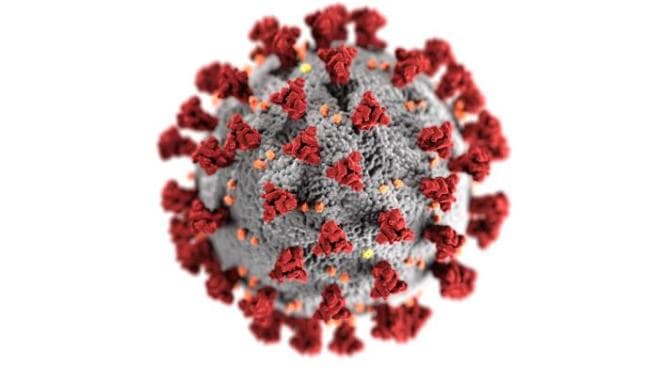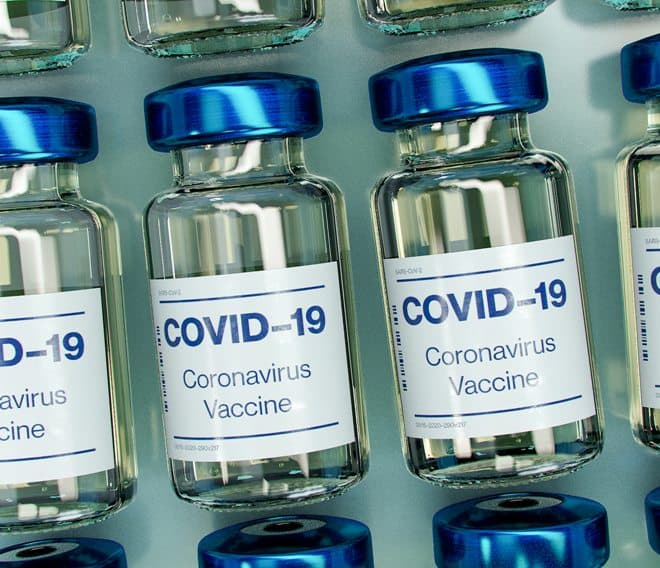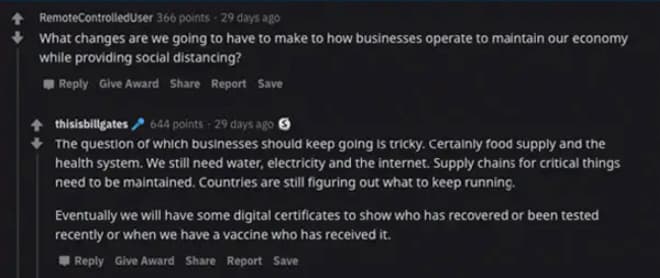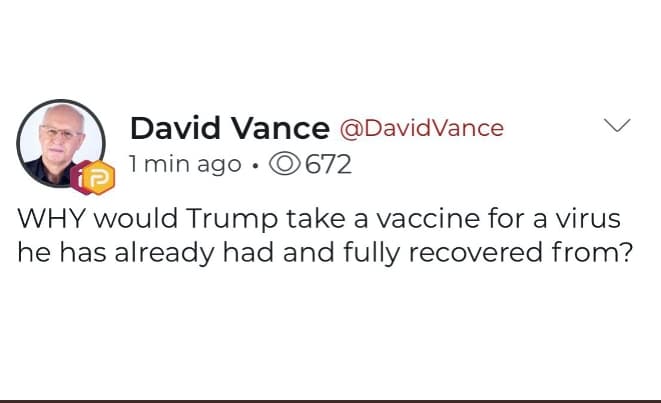
Photo Credit: CDC/ Alissa Eckert, MSMI; Dan Higgins, MAMS
Chances are, in the past month you’ve seen social media posts about the COVID-19 vaccine ranging from polls asking friends if they’d take the vaccine and some surprising answers to memes saying, “So… you’ve been eating hotdogs and McChickens all your life, but don’t want the vaccine because you don’t know what’s in it?”

Photo Credit: Vaccine Facebook Meme
Sure, we all play along and post our thoughts, but beneath the laughter are some seriously odd myths about the COVID-19 vaccine and a few legitimate questions that are definitely worth a little more research on the topic. Here’s a look at the top seven myths about the COVID-19 vaccine and… spoiler alert… one is actually true!
Myth 1: The Vaccine Is Made of Aborted Fetuses
Though it has been widely reported that the COVID-19 vaccines are made partially of cell lines that originated with tissue from abortions, this is just a rumor. Spokespeople for Pfizer and Moderna have confirmed that they actually use a synthetic pharmaceutical product.
The rumor oddly was perpetuated a bit by the Vatican. The Vatican’s doctrinal congregation, the Congregation for the Doctrine of the Faith, issued a note to Roman Catholics, which was approved by Pope Francis, that said (on the assumption that the vaccines DO contain cells from aborted fetuses), “It is morally acceptable to receive Covid-19 vaccines that have used cell lines from aborted fetuses in their research and production process.”
The note went on to say that due to the grave situation of the ongoing pandemic, “all vaccinations recognized as clinically safe and effective can be used in good conscience with the certain knowledge that the use of such vaccines does not constitute formal cooperation with the abortion from which the cells used in the production of the vaccines derive.”

Vaccination By Daniel Scludi on Unsplash
Myth 2: Bill Gates Planted Microchips in the Vaccine
This one goes beyond myth and into conspiracy theory territory. While it is not true, it actually didn’t totally come out of left field. The rumor started after Bill Gates, co-chair of the Bill & Melinda Gates Foundation and co-founder of Microsoft Corporation, participated in an Ask Me Anything (known as an AMA) question and answer session on Reddit in March and his answer to one question got misconstrued.
He was asked, “What changes are we going to have to make to how businesses operate to maintain our economy while providing social distancing?” Gates’ full answer was this: “The question of which businesses should keep going is tricky. Certainly, food supply and the health system. We still need water, electricity and the internet. Supply chains for critical things need to be maintained. Countries are still figuring out what to keep running.”
And then he added: “Eventually we will have some digital certificates to show who has recovered or been tested recently or when we have a vaccine who has received it.” The words “digital certificates” stuck out and many conspiracy theorists took that to mean microchips will be inserted into the vaccines and thus inserted into every person who gets vaccinated to be tracked.

Photo Credit: Screenshot of Bill Gates Reddit AMA
Myth 3: The Vaccine Will Make You Sick
All vaccines have the risk of side effects that might feel like the virus itself. Chances are, you or a friend has had the flu vaccine and then felt slight flu symptoms afterwards. This is normal and even expected. The same can happen with the COVID vaccine, but it will not give you the virus itself.
As of December 28, the U.S. has administered nearly 2 million doses of the vaccine and 4.4 million have been administered in 10 countries around the world. So far, the most common side effect noted was tenderness around the injection area. Other potential side effects of the vaccine include fever, chills, headache, nausea, vomiting, joint pain, muscle pain, feeling tired or overall unwell, and tender or swollen lymph nodes, according to the U.S. Department of Health & Human Services.
The University of Alabama at Birmingham reported the side effects from the safety data from 40,000 people vaccinated as follows: Injection site reactions (84.1%), fatigue (62.9%), headache (55.1%), muscle pain (38.3%), chills (31.9%), joint pain (23.6%), and fever (14.2%). “These are short-lived and similar to what we see with the influenza or shingles vaccines. Severe reactions were very rare (less than 5%). Remember, these side effects mean that your immune system is responding to the vaccine and creating antibodies against COVID-19,” says the UAB report.
Myth 4: It Costs Too Much
The vaccine itself is free to everyone whether they have health insurance or are uninsured. The CDC explains, “However, vaccination providers will be able to charge an administration fee for giving the shot to someone. Vaccine providers can get this fee reimbursed by the patient’s public or private insurance company or, for uninsured patients, by the Health Resources and Services Administration’s Provider Relief Fund.”
Myth 5: If I Wear a Mask and Practice Social Distancing, I Don’t Need the Vaccine
As we know by now, wearing a mask and social distancing are not a fool-proof ways to guard against getting the virus. Slowing the spread of this virus, and eventually stopping it all-together, required all tools available.
The CDC explains: “Vaccines work with your immune system so your body will be ready to fight the virus if you are exposed. Other steps, like covering your mouth and nose with a mask and staying at least six feet away from others, help reduce your chance of being exposed to the virus or spreading it to others. Together, COVID-19 vaccination and following CDC’s recommendations to protect yourself and others will offer the best protection from COVID-19.”
Myth 6: I Can Have an Allergic Reaction
This actually could be true, but only if you fall into a certain category of people. The CDC suggests that people who have had a severe allergic reaction to ANY vaccine or injectable therapy (intramuscular, intravenous or subcutaneous) should not receive the Pfizer-BioNTech vaccine at this time (as of December 28, 2020). A severe reaction is defined by needing to be treated with epinephrine or EpiPen© or if they had to go to the hospital.
They go on to say that vaccine providers should observe patients after vaccination to look out for immediate adverse reactions. Anyone who has a history of anaphylaxis should be observed for 30 minutes, while everyone else only needs to be observed for 15 minutes. Of course, let your doctor know if you’ve ever had an allergic reactions after getting a vaccine.
Myth 7: If I Already Had COVID, I Don’t Need the Vaccine
Because there isn’t enough data yet, it’s not yet known if one is fully immune after they get the virus. To that end, it’s recommended that everyone (except the few aforementioned exceptions of those with severe allergic reactions to vaccinations), gets vaccinated.
“Most patients develop antibodies after they have COVID-19, but not all patients do. In other coronavirus infections (such as the common cold), we know that these antibodies last only three to four months before we are susceptible to infection again. The vaccine produces a strong immune response and lasts at least four months. The Centers for Disease Control and Prevention recommends that patients who recently had COVID-19 should wait 90 days before receiving the vaccine,” explains the CDC.

Photo Credit: Vaccination Twitter Myth
###
Your email address will not be published. Required fields are marked with *.